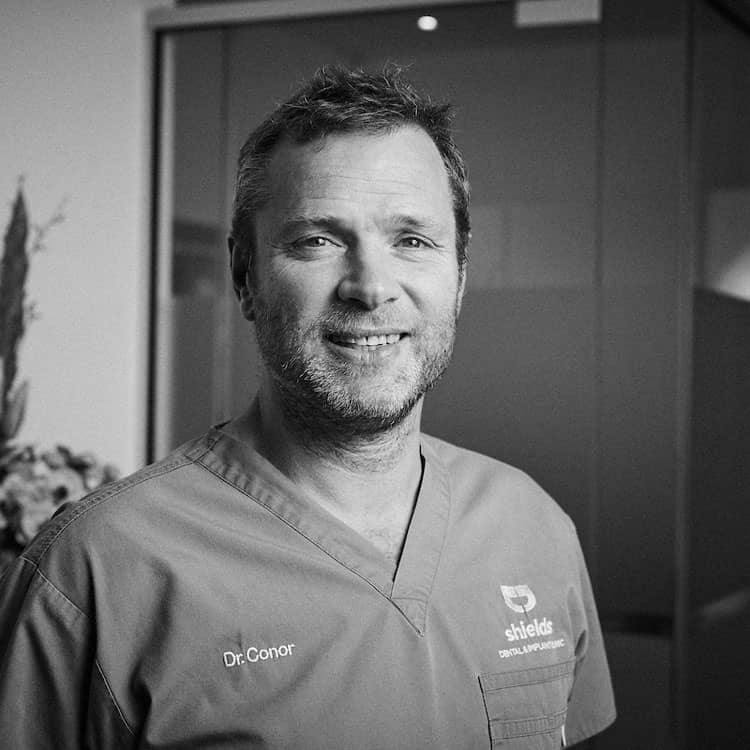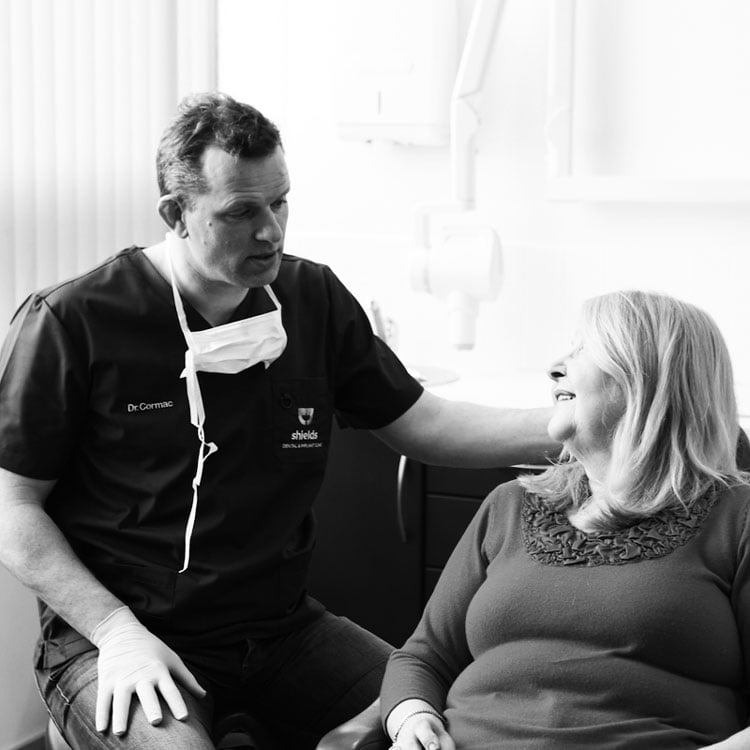Sometimes it’s the only option, but we’ll make it painless and as effortless as possible.
Regretfully, it can come to a point where a failing tooth just has to go, and we have to prepare you for tooth removal. It may sound severe but our surgeons are ready to ensure that this routine process is always as painless as possible.
Tooth removal is usually the method proposed in situations of severe decay, or when your jaw lacks sufficient space to permit wisdom teeth come through painlessly or without impacting on the teeth in front.
Our team uses a strong anaesthetic to completely numb the area during treatment and if you are particularly nervous, we are also skilled in the administration of dental sedation.
Furthermore, there are many options to choose from so don’t worry because your comfort throughout the treatment is our highest priority. As part of any extraction treatment, we advise on options for replacing these missing teeth.
Our general recommendation is dental implants and we have highly skilled and experienced oral surgeons who can advise you further on this. We also offer a free first consultation on dental implants.
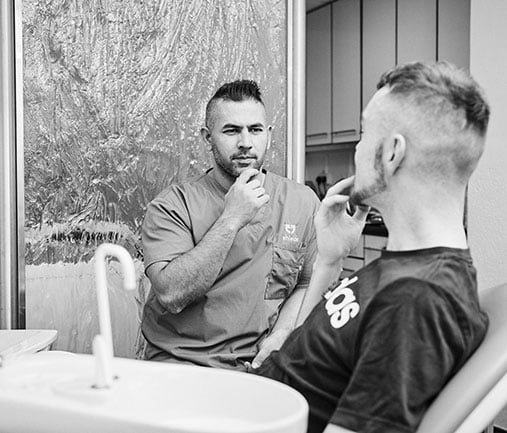
Wisdom tooth
extraction.
Impacted
wisdom teeth.
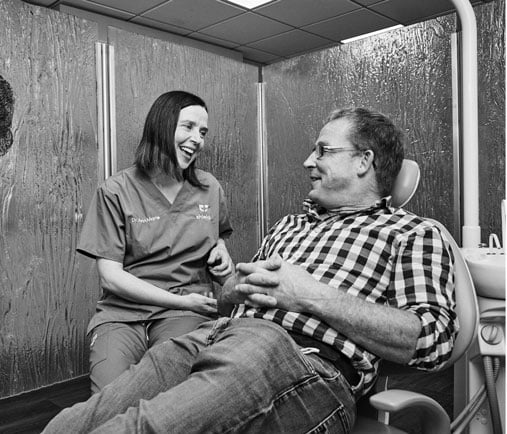

What to
expect afterwards.
The amount of discomfort depends on how easily the tooth was taken out. There is usually some swelling and discomfort for a few days and you should follow any advice you receive, to help with the healing.
Some people also find homeopathic remedies help to reduce discomfort useful. Painkillers such as paracetamol or ibuprofen will usually deal with any pain. However, it is best to stay fairly quiet and relaxed for 24 hours afterwards to ensure there are no bleeding problems.
Some stitches may be required to help the gum heal over, and your dentist will want to see you again, probably a week later, to check on the healing or to remove any stitches.
Patients who undergo extraction at Shields Dental Clinics can also be assured of full guidance on what to do in the period immediately following the extraction.
FAQs.
invisible item
Should I rinse my mouth?
Do not rinse the area for the first 24 hours. This allows the socket to heal, and reduces the chance of you damaging the blood clot. If the clot is damaged, the socket can become inflamed, affecting the healing process.
What else should I avoid?
For at least 24 hours, avoid alcohol, as it can encourage bleeding and delay healing. Smoking should also be avoided for as long as possible, and at least for the rest of the day after extraction. It’s important not to do anything that will increase the blood pressure, which can lead to further bleeding. Lukewarm food and liquids can be eaten and drank as normal, but avoid chewing on that area of your mouth.
What should I do immediately after the extraction?
Take it easy for the rest of the day. Take as little exercise as possible and rest as much as you can. Keep the head up to avoid any bleeding. You’re advised to be particularly cautious about eating and drinking until the anaesthetic wears off. This is because until then, you will not feel pain fully. Common problems immediately after an extraction include accidentally chewing the cheek and scalding the mouth with hot food or drinks. When resting, try to keep the head higher for the first night, using an extra pillow. It’s also advisable to use an old pillowcase, or to place a towel on the pillow, in case there is bleeding.
What if it bleeds?
There may be some slight bleeding for the first day or so, and sometimes when a small amount of blood is mixed with a larger amount of saliva, it can look more dramatic than it actually is. If there is some bleeding, do not rinse, but carefully place a folded piece of clean cotton material over the extraction site, and apply pressure by biting firmly on the material for at least 15 minutes. If the bleeding has not stopped after an hour or two, contact your dentist.
When should I brush?
It is extremely important to keep your mouth clean after an extraction, but you should be careful and gentle when cleaning around the extraction site.
Is an extraction painful afterwards?
There is usually some tenderness in the area of the extraction for the first few days. Do not take aspirin, as this will make your mouth bleed. In most cases, simple pain relief—what you would normally take to alleviate a headache—should be sufficient to ease the discomfort. However, always follow the manufacturer’s instructions. If you are in doubt, check with your GP.
What do I do after the first 24 hours?
It is important to keep your mouth and the extraction site as clean as possible, making sure that the socket is kept clear of all food and debris. After the no-rinse initial 24-hour period, you should use a salt-water mouthwash—a teaspoon of salt in a glass of warm water—to gently rinse around the socket twice a day. You should do this for at least a week, or as long as your are advised to by your dentist. In the long term, a healthy diet, supplemented with Vitamin C, will help your mouth to heal.
I am still in pain: what could it be?
Sometimes, the socket can become inflamed. This occurs when there is little or no blood clot in the socket and the bony socket walls are exposed. This is called a dry socket and in some cases is worse than the original toothache! It’s important to see your dentist, who may place a dressing in the socket and prescribe a course of antibiotics to help relieve the inflammation. It’s also important to note that it is perfectly normal to be able to feel the sharp edge of a tooth socket with the tongue, and that sometimes small pieces of bone may work their way to the surface of the socket.
What medicines should I avoid?
It’s important not to use anything containing aspirin, as aspirin can thin the blood slightly and cause bleeding. Asthma sufferers should avoid Ibuprofen-based pain relief. Again check, with your chemist or dentist if you’re worried or feel you need something stronger.
Will my dentist need to see me again?
The dentist will give you a follow-up appointment if the extraction has been particularly difficult, possibly to remove any stitches required, or simply to check how the area is healing. The dentist will also want to discuss the options for replacing the lost tooth.
What problems should I be prepared for?
If part of the wisdom tooth has appeared through the gum and part of it is still covered, the gum may become sore and perhaps swollen. Food particles and bacteria can collect under the gum edge, and it will be difficult to clean the area effectively. Your dentist will tell you whether this is a temporary problem that can be dealt with by using mouthwashes and special cleaning methods (and possibly antibiotics), or whether it is better to have the tooth removed.
How can I help myself?
If your gums are sore and swollen, use a mouthwash of medium hot water with a teaspoonful of salt. (Check that it is not too hot before using it.) Swish the salt water around the tooth, trying to get into the areas your toothbrush cannot reach. An antibacterial mouthwash such as Corsodyl can also reduce inflammation. Pain-relieving tablets such as paracetamol or aspirin can also be useful in the short term, but see your dentist if the pain continues.
What if the pain does not go away?
If the pain does not go away or if you find it difficult to open your mouth, you should see a dentist. They will be able to see the cause of the problem, and tell you what to do. It may help to clean around the tooth very thoroughly, and the dentist may prescribe an antibiotic.
Are x-rays needed?
The dentist will usually take x-rays to see the position of the root, and to see whether there is room for the tooth to come through into a useful position.
Are wisdom teeth difficult to take out?
It depends on the position and shape of the roots, which will be determined by an x-ray. Upper wisdom teeth are often easier to remove than lower ones, which are more likely to be impacted. Your dentist will decide on whether the tooth should be removed at the dental practice, or whether you should be referred to an oral surgeon at a hospital.
Very occasionally there is a possibility of some numbness of the lip after the removal of a lower tooth—your dentist will tell you if it is possible in your case. You will probably require a local anaesthetic—as you would require for a filling—or sedation. You could also have a general anaesthetic (where you would be asleep), but this will usually be given only in a hospital.
Will it make any difference to my face or mouth?
Taking wisdom teeth out may cause some swelling for a few days. But as soon as the area is healed, there will be no difference to your face or appearance. The mouth will feel more comfortable and less crowded, especially if the teeth were impacted.
What is Regenerative Socket Preservation?
Extracting a tooth leaves a small hole where that tooth used to be. This is known as a socket and it can become quite sensitive after an extraction. Nerves can become exposed if the blood clot gets knocked loose after the removal of a tooth.
A tooth extraction can also lead to bone loss and cosmetic issues due to moving teeth. Socket preservation helps to protect the alveolar ridge, which is the bone that surrounds your teeth’s roots.
The procedure involves the placement of PRGF – protein rich growth factors (centrifuged from your own blood) within the socket at the time of extraction, with or without bone grafting material (or scaffold). This creates a rich environment for improved bone regeneration which helps to preserve the hard and soft tissues.
Is an extraction painful afterwards?
There is usually some tenderness in the area of the extraction for the first few days. Do not take aspirin, as this will make your mouth bleed. In most cases, simple pain relief—what you would normally take to alleviate a headache—should be sufficient to ease the discomfort. However, always follow the manufacturer’s instructions. If you are in doubt, check with your GP.
Our
treatments.
From the regular check-up to the specialist and advanced treatments that are needed throughout life, we always use state-of-the-art equipment and latest recommended techniques.

Open 7 days*
Highly trained specialists and dentists
Your safety is guaranteed in our hands
Payment options
Technically advanced
Convenient locations
No obligation consultations
Find out what makes us different.
Recent Reviews.

SCR, Limerick, Shields Dental & Orthodontic Clinic

Castletroy, Limerick, Shields Dental & Orthodontic Clinic
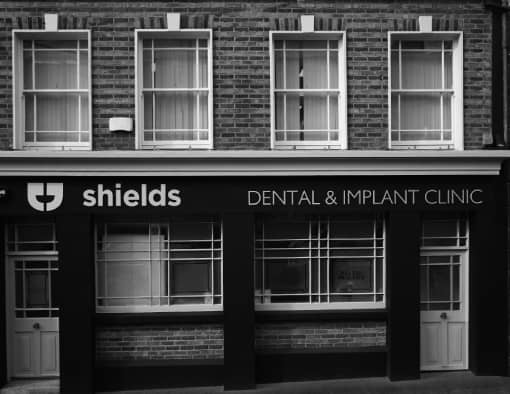
Roscrea, Tipperary, Shields Dental & Orthodontic Clinic

Blackrock, Dublin, Shields Dental & Orthodontic Clinic
Convenient
locations.
You don’t have to go to Beverly Hills to look good, you can go local. In convenient locations in Limerick, Castletroy, Roscrea and Blackrock Dublin. Comfortable but advanced, friendly but professional. Click on your preferred location in the menu or use the arrows to discover more.
For the
smile you have
always wanted.
Use our FREE consultation service to speak to one of our Treatment Coordinators, who give you information about how we can help, without any financial commitment.
Most importantly it helps to build your confidence in starting your journey with Shields to the smile you have always wanted.
We’ll discuss with you what you would like to achieve with your dental health and the appearance of your smile, answer any questions and listen to any problems you may have had with your teeth in the past.

